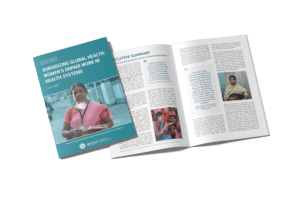Unpaid work violates women’s rights and threatens global health security
7 July 2022
Six million women are currently subsidizing health systems
 Global health security and women’s rights are being undermined by the lack of payment or gross underpayment of women health workers, according to a new report, launched July 7th, 2022, from Women in Global Health.
Global health security and women’s rights are being undermined by the lack of payment or gross underpayment of women health workers, according to a new report, launched July 7th, 2022, from Women in Global Health.
“Subsidizing global health” found that upwards of six million women worldwide are subsidizing health systems with their unpaid or grossly underpaid labor.
“We know that women make up 90 percent of frontline health workers globally and there is a very clear connection between the failure to adequately pay health workers, mostly women and what’s being termed The Great Resignation of health workers, putting health systems under extreme stress,” said Dr Magda Robalo, Managing Director, Women in Global Health.
“Women would choose to be paid if they had that choice. Under paying or not paying them is not only a violation of economic justice, it is poor policy to engage a large proportion of your workforce under unacceptable working conditions. It is no wonder that so many are leaving the profession.”
The report – compiled from existing research and interviews with women health workers in Ethiopia, India, Malawi, Mexico and Zambia – found a serious absence of data about women working unpaid in health systems. At the start of the pandemic, some countries were unable to estimate their need for personal protective equipment (PPE) due to lack of data on the number of health workers delivering critical public health programs in communities.
“It seems a paradox that very poor women with heavy work commitments should agree to take on additional unpaid work in health systems,” said Ann Keeling, Senior Fellow with Women in Global Health and main author of the report.
“But opportunities for paid work for women may be limited by lack of mobility or cultural ideas of decent occupations for women – under these circumstances, even unpaid work may seem like an opportunity.”
The pandemic has exposed the magnitude of the ‘informal’ workforce in health, particularly in low income countries where female workers are often titled ‘volunteers’ or ‘community activists’ and generally unrecorded in formal labor market statistics.
The findings in “Subsidizing global health” mirror those of the Lancet Commission on Women and Health which calculated that women’s contribution to the global economy was $3 trillion, with half of that in the form of unpaid work.
It recommends that unpaid and underpaid workers working in core health systems roles need to be counted to reflect the true figure of health workers delivering services. Creating decent jobs for all women in the formal health workforce would address the projected 10 million gap that is threatening global health security. It would also have the wider benefit of increasing gender equality and women’s economic empowerment.